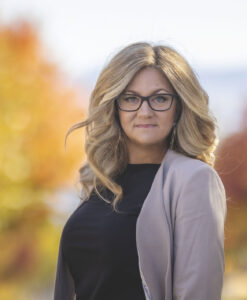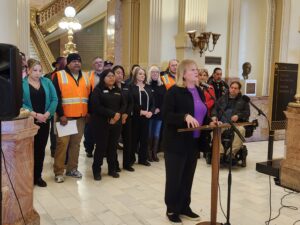Facing severe business backlash and bipartisan opposition, a pair of Colorado House Democrats on Thursday killed their bill to require a slew of new temperature-based safety measures from employers when mercury levels top 80 degrees or dip below 30 degrees.
Reps. Elizabeth Velasco of Glenwood Springs and Meg Froelich of Greenwood Village drafted House Bill 1286 to protect workers, often those earning lower incomes, who toil outside in sometimes hot and sometimes cold temperatures. After Colorado recorded 474 heat-related emergency-room visits and 13 heat-related deaths in 2023, they wanted to require that employers offer more frequent breaks in shade and temperature-controlled areas with cool water to take care of those workers.
Business groups, however, responded that not only are they already following federal law on the subject but that the new conditions proposed by the bill are both fiscally and technically infeasible. Extended rest periods, modified work quotas and constant monitoring of workers would hammer industries from agriculture to construction to outdoor recreation, raising costs of services and driving work to other states, they said.
“These industries already operate under challenging conditions, and HB 25-1286 would impose extreme compliance costs and workforce disruptions that are nearly impossible to manage given Colorado’s ever-fluctuating temperatures,” wrote Grand Junction Area Chamber of Commerce President/CEO Candace Carnahan in a letter to legislators. “The impracticality of adjusting business operations to meet an inflexible, one-size-fits-all rule will ultimately stifle economic growth, deter business investment and threaten job stability across multiple sectors.”

Candace Carnahan is president/CEO of the Grand Junction Area Chamber of Commerce.
Why temperature was an issue for sponsors
A clearly frustrated Velasco acknowledged that she didn’t have the votes to pass the bill as she asked the House Business Affairs & Labor Committee to kill HB 1286 Thursday, but she said she’ll work with a coalition of supporters to bring something back in 2026. That coalition — which includes unions, environmental groups, worker advocates and the Towards Justice law firm — must fight for low-paid workers being hurt by excessive labor in extreme conditions like sweltering warehouses and “burning rooftops,” she said.
“What we will not compromise on is human life and safety. There should be no exemptions putting human life in danger,” Velasco told the committee. “No one should risk their lives for a paycheck … States like Colorado can lead the way, and it’s time for the rest of the country to follow.”
HB 1286 sought to regulate temperature conditions when there is an increased risk factor, defining an initial heat trigger as a heat index of 80 degrees Fahrenheit and an initial cold trigger as a wind-chill factor reaching 30 degrees with 20-mile-per-hour gusts. Employers would have been required to develop temperature-monitoring plans and track conditions at all sites and, when triggers have been met for outdoor areas or indoor areas without air flow, enact measures that include:
- Access to shaded or air-conditioned break areas in hot temperatures and heated indoor areas for cold temperatures;
- Provision of at least 32 ounces of drinkable water per hour, kept at 60 degrees Fahrenheit or cooler;
- Allowance of a 15-minute paid rest break at least every two hours when temperatures are high;
- Maintenance of effective two-way communication with workers and contact with each worker at least every two hours; and,
- Provision of temperature-illness-prevention training for each employee before they work in such extreme temperatures.

Colorado state Rep. Elizabeth Velasco speaks on the House floor during a special session in 2024.
Bill included new private right of action
The bill would have allowed workers to bring civil lawsuits against employers accused of violating the law and be awarded compensatory and punitive damages. Legislative Council analysts estimated the state must hire five new investigators to look into claims and must set aside nearly $1 million for lawsuits that would be filed against state government — costs that bill sponsors said helped to stir opposition from Gov. Jared Polis.
In addition, Froelich told the committee on Thursday, nearly every industry asked for a carveout and very few suggested changes that could make the bill workable. The only sectors exempted from HB 1286 were firefighters, emergency responders and technical search-and-rescue teams, as well as those engaged in telework.
“The opposition has said this is burdensome and too prescriptive,” Froelich said. “We heard a lot of hyperbole that we hear all the time … that this would hurt all projects and building for all time in Colorado.”

Colorado state Rep. Meg Froelich speaks during a January 2024 news conference on a proposed wage-theft prevention bill.
Temperature regulations would hit particular industries hard
Carnahan, however, said there is no hyperbole involved in the threats that would have faced businesses were HB 1286 to pass. Just a few of the examples she offered in the letter to legislators involving Western Slope industries included:
- Delays in agricultural work that could jeopardize crops and livestock, leading to “devastating” financial losses;
- Disruption of project timelines in construction that could drive up costs, making critical infrastructure development, including a lot of public projects, infeasible; and,
- Reduced competitiveness in sectors from outdoor recreation to oil-and-gas drilling when operators already on tight margins must raise prices to cover new costs from the bill.
“Mesa County and Western Colorado’s businesses and workers deserve policies that foster economic growth, not regulatory overreach that threatens our livelihoods,” Carnahan wrote, echoing the sentiments of many local and statewide chambers of commerce. “This bill is an unnecessary burden on our economy, and we strongly oppose its passage.”
The battle over HB 1286 came at a time when business leaders say they are reeling from overregulation and have asked legislators to stop piling costly new rules onto them. The Colorado Chamber of Commerce commissioned a study in 2024 that found that Colorado is the sixth-most regulated state in America, having seen a particular spike in new rules since 2020.
